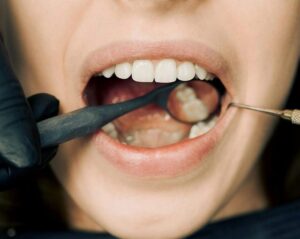“Nothing’s hurting, so surely everything is ok.” It’s a common thought, and we wish it were that simple.
The truth is, your oral health is a cornerstone of your general health, confidence, and happiness. Its importance is often underestimated. The real goal of a dental check-up isn’t just to fix problems—it’s to catch small issues before they grow, and big issues before they become serious. Ultimately, the aim is to stop dental problems before they even start.
This article explains why preventative check-ups are so vital and what you can expect.
1. What Happens During a Dental Check-Up?

During your check-up, your dentist performs a comprehensive assessment of your oral health. This isn’t just a quick look at your teeth.
- Teeth and Gum Assessment: We carefully examine the health of every tooth and the surrounding gums to ensure everything is in top condition.
- Hygiene Review: We review your brushing and interdental cleaning (cleaning between the teeth). This is a chance to get praise for your great work or, more commonly, receive friendly, tailored advice on how to improve. We can recommend the right tools to help you do the best possible job. You may also be referred for a professional cleaning with a dental hygienist.
- Digital X-rays: If necessary, we take X-rays to see what the naked eye can’t—like issues between teeth or under existing fillings. Modern dental practices use state-of-the-art digital X-rays, which offer the lowest possible radiation dose while providing a crystal-clear image for accurate diagnosis.
2. The Power of Prevention: Tackling Problems in Your Mouth
Regular examinations allow for the early detection of three major oral health concerns.
- Tooth Decay: You might know that bacteria cause cavities, but what you may not know is that decay starts on the outer surface of the tooth (the enamel) and silently works its way inwards. Your dentist can spot the very first signs of this process, often before a cavity even forms. Catching it this early means it can be treated with a much smaller, less invasive filling. In some cases, we can even help you reverse the process and avoid a filling altogether!
- Gum Disease: We carefully screen for gum disease (periodontitis). If caught early, we can create a tailored treatment plan to stop it from progressing. With excellent home care based on our advice, early-stage gum disease can often be reversed. The result? You avoid the loose, painful teeth that can occur if it’s left untreated.
- Oral Cancer Screening: Your dentist is one of the only healthcare professionals who regularly examines your mouth. All dentists are trained to perform oral cancer screenings at every check-up. Finding any suspicious signs early and ensuring a swift, urgent referral to a specialist is a critical, life-saving part of our role.
3. The Mouth-Body Connection: More Than Just a Smile
Emerging research highlights that what happens in your mouth doesn’t stay in your mouth. Harmful oral bacteria can enter the bloodstream, triggering inflammation and contributing to serious systemic conditions.
Poor oral hygiene and gum disease are increasingly being linked to:
- Heart disease and stroke
- Complications with diabetes
- Dementia
- Rheumatoid arthritis
- Adverse pregnancy outcomes, like pre-term births and pre-eclampsia
For instance, one well-documented link involves the oral bacterium F. nucleatum. A 2019 study in the journal EMBO Reports found this specific bacterium in breast cancer tumours, suggesting a link between advanced gum disease and the development of the cancer. This powerful evidence shows that regular dental check-ups aren’t just about teeth—they’re a vital part of protecting your long-term health.
Book an appointment
4. Your Homework: Best Practices Between Visits
A great oral health routine is your best defence. Here’s how to look after your teeth between visits:
- Brushing and Interdental Cleaning: Brushing twice a day is essential, but so is cleaning between your teeth with floss or interdental brushes. Plaque builds up in these hard-to-reach areas, and physically removing it is the most effective way to prevent decay and gum disease. Your dentist can show you the correct technique and ensure you’re using the right-sized tools.
- The Truth About Mouthwash: A common question is whether mouthwash is as good as brushing. In short, no. While it can be a helpful supplement, it cannot physically remove plaque like brushing and flossing can. Think of it as an optional extra, not a replacement for the fundamentals.
- Fluoride – Your Secret Weapon: Topical fluoride in toothpaste is proven to strengthen teeth and reduce cavities. To maximise its benefit, follow this simple rule: spit, don’t rinse. After brushing, just spit out the excess toothpaste. This leaves a protective layer of fluoride on your teeth.
- Watch Out for Sugar: The harmful bacteria in your mouth are fuelled by one thing: sugar. Minimising how often and how much sugar you consume is key. If you do have a sugary treat, it’s best to have it with a main meal rather than snacking on it throughout the day.
- Smoking and Oral Health: Tobacco is terrible for your gums. Nicotine constricts blood vessels, which prevents your body’s natural defence and healing mechanisms from reaching your gums, allowing gum disease to progress much faster.
5. We Understand: Addressing Common Concerns
- Dental Anxiety: This is one of the most common reasons people avoid the dentist—but you are not alone. At practices like Magnolia House Dental Practice, the team goes the extra mile to make your visit comfortable. This includes explaining every step, discussing all your options, and providing a friendly, listening ear.
- Worried About Cost? Regular check-ups are one of the most cost-effective healthcare investments you can make. Prevention is far cheaper than cure. Catching a problem early avoids the need for more complex and expensive treatments down the line. Most practices offer flexible payment plans or can help you navigate insurance options.
6. Conclusion: Your Health is in Your Hands
Hopefully, this shows that a regular dental check-up is far more than a tick-box exercise. It is your front-line defence against decay and gum disease, and a crucial part of protecting yourself from wider health issues. It keeps your mouth clean, your smile confident, and your body healthier.
Don’t wait for something to hurt. Prevention truly is the best medicine. Schedule your next check-up today and give yourself the peace of mind that your health is in expert hands.








